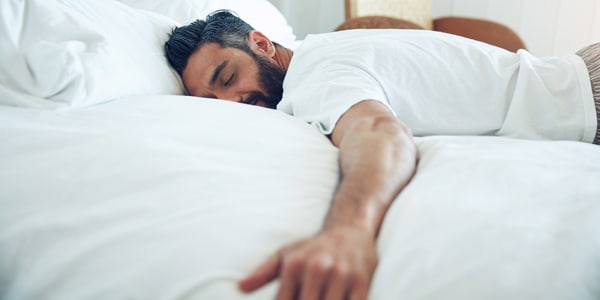How to sleep better
Struggling to get enough good quality sleep? Here’s what you need to know.
Health Agenda magazine
May 2017
Considering we do it every night, you’d think we’d have this sleep thing down pat. And yet, according to the 2017 Sealy Sleep Census of 11,000 people worldwide, only a quarter of us get a full eight hours a night. And worse than that, almost 1 in 5 of us never wake up feeling well rested.
While the physical side effects of long-term poor sleep are well documented (higher risk of hypertension, heart disease and type 2 diabetes), the effects on your mind, mood and mental health are just as serious.

Negative effects
Everyone knows how you feel after a bad night’s sleep – gritty eyes, a craving for food or a stimulant such as coffee, and irritability. Your work performance won’t be great either: a study by the University of Freiburg, published in 2016, found that the role of sleep is to wipe your brain synapses clean at the end of the day, when they’re at full capacity, and reset the brain’s memory connection. Without it, your brain can’t function properly and starts to behave erratically.
While it’s fairly easy to get over one night of poor sleep, the cognitive effects become more serious when you’re regularly staring at the clock at 3am. “When adults get tired we become lethargic and clumsier, and our thoughts become muddled and slower. There’s also a higher risk of an accident or injury at work because you might not be paying attention,” says Dr Sarah Biggs, executive board member of the Australasian Sleep Association.
The mood connection
Experts are also beginning to unravel the links between poor sleep and mood disorders. “There’s no doubt that depression and anxiety go hand-in-hand with poor sleep,” says Dr Dev Banerjee, a sleep specialist and medical director at the University of Sydney Woolcock Institute of Medical Research.
Science shows that people who have psychiatric disorders such as depression, anxiety, ADHD or bipolar disorder have a much higher incidence of chronic sleep problems than the rest of the population. “And poor sleep tends to amplify mood disorders,” he notes.
But here’s the kicker: chronic poor sleep may also trigger mental health issues. “Being a bad sleeper has also been shown to lead to higher chances of depression,” says Professor Dorothy Bruck, Chair of the Sleep Health Foundation.
What is normal sleep?
While eight hours a night is often cited as the ideal, it’s really just an average figure. What’s normal for you is what leaves you feeling refreshed in the morning. A range of six to nine hours a night is typical.
And for all that we’re told we should be in bed before midnight, for some of us, that’s unnatural. In 1976 a survey called the Morningness-Eveningness Questionnaire was developed by two researchers from Mid Sweden University and it showed that early-rising ‘larks’ and late night ‘owls’ really were biologically determined.
Over the four decades since, multiple studies have supported the idea we each have our own ‘chronotype’, though this can change with age. A large 2016 study of German adolescents and adults showed that children were significantly oriented to morning, then became dramatically more evening oriented at puberty before settling into their adult lark or owl patterns in their 20s.
Sleep strategies
Interrupted sleep where you wake up during the night is normal, and indeed unavoidable if you have small children. If you can go back to sleep easily, then it’s nothing to worry about. It’s when you can’t get back to sleep or when it takes you hours to fall asleep, or you’re consistently feeling tired during the day that it’s time to make lifestyle changes or consider medical advice.
If lack of sleep is making you depressed, irritable or anxious, get checked by your GP. “Find out if it’s just a short period of stress or if there’s an underlying physical problem like anaemia or a thyroid issue,” Professor Bruck says. Both these conditions commonly have insomnia as a symptom, sometimes accompanied by fatigue, which can increase anxiety.
Whether you simply need to reconsider how much attention you pay to your sleep, or to look for more significant medical advice, Dr Biggs recommend not letting yourself obsess on the topic too much if you’re lying awake of an evening. “It’s a chicken and egg thing,” she says. “If you’re really stressed, you’re pumping yourself full of cortisol, which will keep you awake.”
Instead, she suggests getting up and doing something quiet until you feel tired. “Have a bath, drink a cup of herbal tea, read a book or get one of those adult colouring books – they’re methodical and relaxing. Whatever you need to slow your body and your mind down.”
Hear from people living with sleep apnoea and insomnia on the HCF website. They share their strategies for managing their condition, offer practical advice on coping with the symptoms and words of wisdom on maintaining a positive mindset.